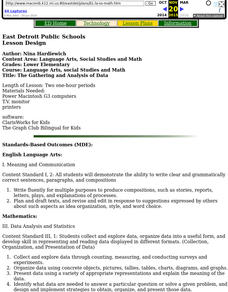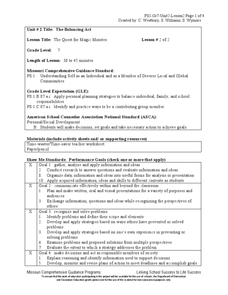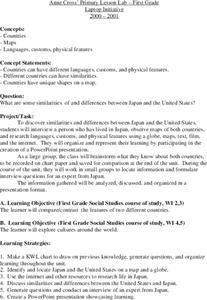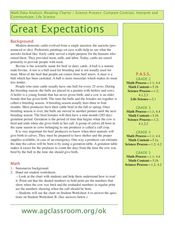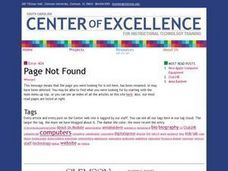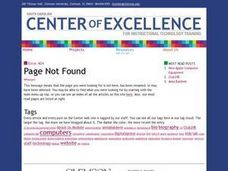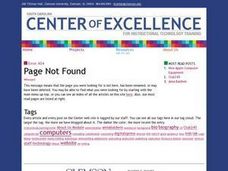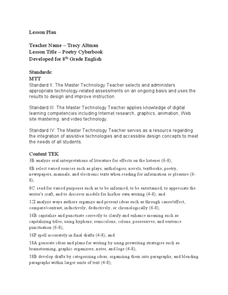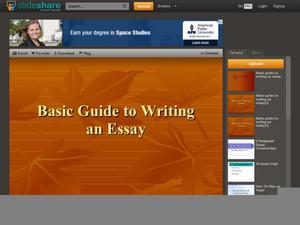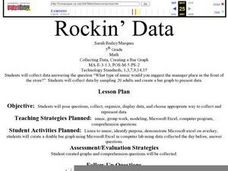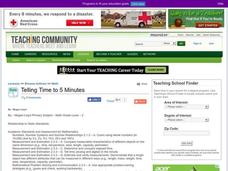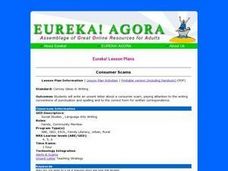Curated OER
The Gathering and Analysis of Data
Young mathematicians gather data on a topic, graph it in various forms, interpret the information, and write a summary of the data. They present their data and graphs to the class.
Curated OER
STAR Deputies, Unite!
Second graders work in small groups to brainstorm solutions to safety situations. They use the STAR safety model worksheets and role play as STAR deputies. Based on the scenario presented on the worksheet, they develop skits that show a...
Curated OER
The Adventures of Huckleberry Finn: Semantic Feature Analysis
Racist, independent, conflicted? Readers of The Adventures of Huckleberry Finn brainstorm words that describe the traits of characters in Twain’s novel and then rate these qualities in several of their favorite characters. Individuals...
Curated OER
The Quest for Magic Minutes
Seventh graders explore ways to manage their time. As a class, they brainstorm time-wasters that keep them from their responsibilities. In teams, they design one time-saver for each time-waster. Afterward, they design a commercial based...
Novelinks
The Wednesday Wars: KWHL
What do you know about the Vietnam War? What do you want to find out? How to do you plan on finding this information? To gain an understanding of the backdrop of The Wednesday Wars, class members create a KWHL chart and then begin...
Curated OER
Japan
First graders investigate the similarities and differences between Japan and the United States. They develop a KWL chart, locate Japan and the U.S. on a globe, conduct Internet research on life in Japan, conduct an interview, and create...
Curated OER
Maus: A KWHL Approach
After reading the introduction to Maus I, class members use A KWHL approach to determine what they know, what they want to know, and where they can find information about World War II, the Holocaust, and other topics associated with Art...
Curated OER
Inductive and Deductive Reasoning
Students use logical arguments and inductive reasoning to make or disprove conjectures. After observing a teacher led demonstration, students discover that the deductive process narrows facts to a few possible conclusions. In groups,...
Curated OER
I am Proud To Be a 2nd Grader
Second graders discuss the need for each one to meet educational expectations. They draw pictures and write a summary to explain important behavior for a 2nd grader. In groups, 2nd graders discuss the importance of following rules, and...
Curated OER
Great Expectations!
Second graders participate in a game that focuses on appropriate and inappropriate behavior for second grade. They draw a game card and read it out loud, and students discuss and identify the behavior as appropriate or inappropriate....
Curated OER
Reflection on Educational Goal Setting and Self-Assessment
Third graders evaluate their performance at school. They examine their most recent spelling test scores to determine whether or not they met their goals for the test.
Curated OER
Family Tree Community Project
Fifth graders answer questions such as: Where does my family come from? What was it like for my ancestors to grow up as America developed? What differences in society were present then? What was similar to today? students conduct...
Curated OER
The Unofficial Guide to Middle School
Sixth graders use Inspiration, Microsoft Word, Microsoft Publisher, digital camera, scanners, and video camera
Curated OER
What Do You Want To Be When You Grow Up?
Participate in authentic career research, and make effective and realistic career/academic choices entering high school. Develop communication skills, demonstrate English language arts proficiency, and share a group presentation with...
Curated OER
Poetry Cyberbook
Emerging poets design a website and then post seven original poems as well as their written critique of these poems. Although the resource mentions Inspiration and FrontPage technologies, any software could be substituted.
Curated OER
Viral Marketing
What is "viral marketing" and how does it relate to mathematics? Young mathematicians use exponential functions to develop a mathematical model for a business advertising campaign. Learners then see how their campaigns increase...
Curated OER
Basic Guide to Writing an Essay
Introducing your class to essay writing? The gentle tone, concise explanations, and clear examples provided by a 17-slide presentation introduces young writers to the expository essay format. All that's missing is a complete essay with...
Curated OER
Classifying Shells
Young scholars observe and classify different types of shells. They compare and contrast an exhibit they created with one that already exists in a musuem. They discover the different characteristics of shells.
Curated OER
Color Your Destiny
Eighth graders read and discuss a variety of children's books that deal with feelings, self-concept and how they affect a person's perceptions of themselves as well as their world. They also tie in interrelationships of visual and...
Curated OER
Math Prefixes
Students use a dictionary to gather appropriate information for writing simple definitions. They recognize prefixes that relate to numbers, such as mono-, bi-, and tri-. Pupils use their creative abilities to extrapolate new words to...
Curated OER
Rockin' Data
Fifth graders are given the questions, "What type of music would you suggest the manager place in front of the store?". Students collect data by talking with 20 adults and create a bar graph on the computer to present the data.
Curated OER
Telling Time to 5 Minutes
In this second grade lesson your class will practice telling time. The goal is to tell time to five minutes using an analog clock. Your young students count by 5 minute intervals and discuss elapsed time.
Curated OER
Progressing Towards Graduation
Eleventh graders write a paragraph about what they are going to do after graduating from high school. As a class, they share how they are going to meet their goals and discuss other options other than going to college. To end the lesson,...
Curated OER
Convey Ideas in Writing
Write an unsent letter about a consumer scam, paying attention to the writing conventions of punctuation and spelling. This lesson plan could be adapted to fit a variety of social issues in which letter writing is appropriate. 4
